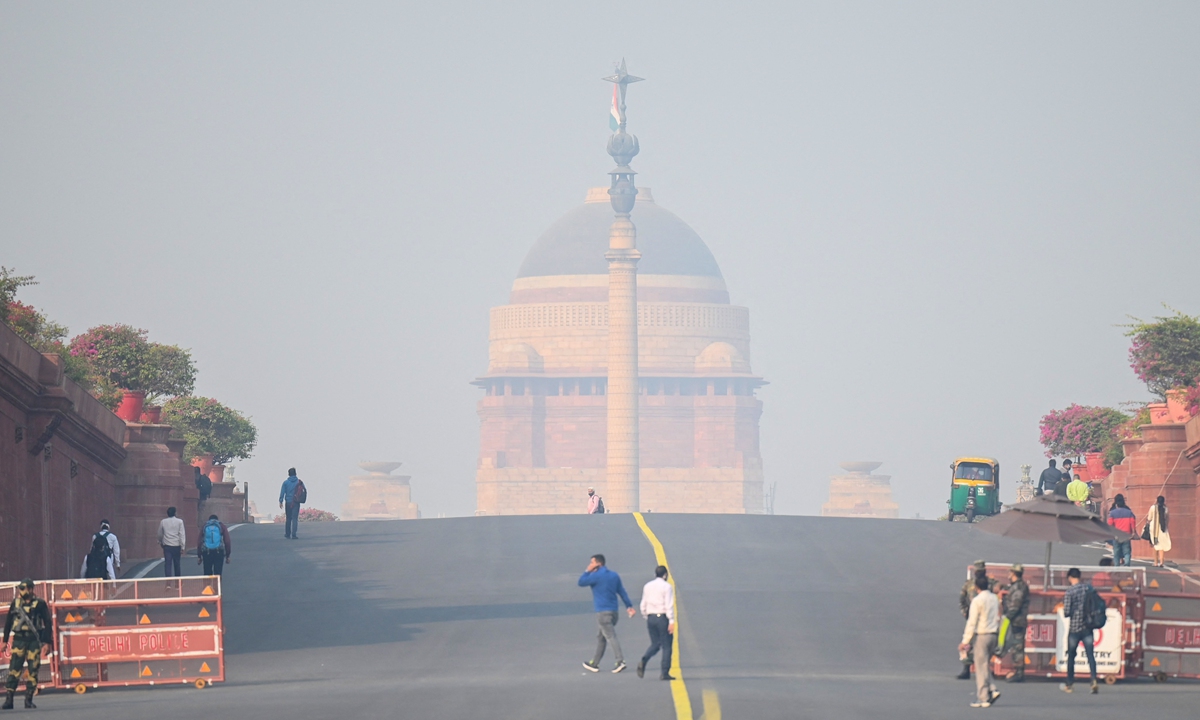India, China should strengthen cooperation on carbon neutrality

People walk near the presidential palace amid heavy smog conditions in New Delhi, India on Monday. Photo: AFP
A potential lockdown in India in response to worrying air pollution levels shows that the country should pay more attention to environmental governance amid its continuous efforts to compete with China as a world-class power, experts said.
Since the start of November, air pollution in New Delhi has been particularly bad. A weekend lockdown and work-from-home for a week were suggested by the Delhi government on Tuesday at an emergency meeting ordered by the Supreme Court to fight the capital’s air crisis, which has caused schools and construction sites to be shut, according to Indian media reports.
The Indian Meteorological Department predicted that New Delhi’s air quality may deteriorate further in the next few days, but there may be an improvement after November 21.
Qian Feng, director of the research department at the National Strategy Institute at Tsinghua University, told the Global Times on Thursday that the air crisis in New Delhi was caused by a raft of factors including climate, terrain and poor production and living habits.
“India’s environmental governance has not caught up with its march toward industrialization and mass manufacturing,” said Qian.
The South Asian country intends to compete with China in hard power areas like defense and aerospace, but it should not neglect efforts in building up soft power or it will be hard to reverse the country’s damaged image, he noted, adding that tackling air pollution must become a more urgent goal.
In the meantime, it is noticeable that China and India, as the world’s two largest developing countries, have a similar situation and stance on the need for environmental governance, experts said.
“Many developing countries don’t have enough access to energy supplies. It is unfair for the West to heap criticism on China and India for weakening their coal pledge,” said Long Xingchun, a senior research fellow at the Academy of Regional and Global Governance under Beijing Foreign Studies University and president of the Chengdu Institute of World Affairs.
“In many developing countries, not everyone has access to electricity and energy supply is not adequate. Before asking all countries to stop using coal, consideration should be given to the energy shortfall in these countries to ensure their energy security,” said Zhao Lijian, spokesperson for China’s Foreign Ministry on Monday, following the COP26 summit in Glasgow.
India, the world’s third-largest carbon emitter, has outlined its commitment to reach net-zero carbon emissions by 2070.
It's a very aggressive commitment, and looking at the financing it will not be easy, said Natarajan Chandrasekaran, chairperson of Tata Group at the New Economy Forum organized by Bloomberg on Thursday.
“The banking system in India, which is already stressed, is not going to be coming forward easily to do these kinds of projects. Many of these projects are going to be pilots, especially the hydrogen project. These small projects will not be enough for big institutions to come in,” he said.
Experts said that for India to achieve its ambitions, it should consider cooperating with China and facing opportunities and challenges together.

